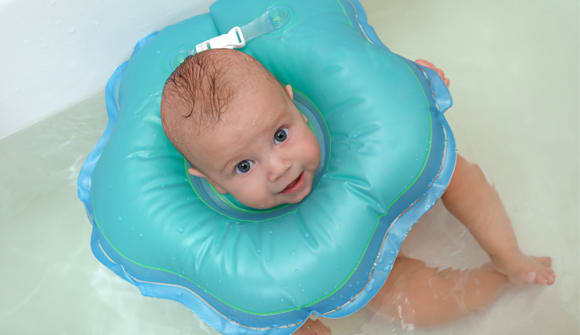No more neck floaties
FDA says parents should avoid these popular products.
Article Author: Katie McPherson
Article Date:

On June 28, 2022, the U.S. Food and Drug Administration (FDA) released new guidelines urging parents to stop using neck floats for babies, citing two accidents that led to the hospitalization of one infant and the death of another.
The FDA specifically warned parents of children with certain medical conditions, including spina bifida, spinal muscular atrophy type 1, cerebral palsy, and more, to steer clear of the products. Some neck float companies state their products can help support these infants’ physical development during water therapy. So what do parents need to know?
What are neck floats?
These plastic inflatable rings are placed around a baby’s neck, under the chin, to help them float in water before they’ve developed head and neck control. They’re marketed to parents to use at home in the bathtub for their baby’s enjoyment, and to some health care providers to use in water therapy when treating young patients.
What’s the fuss?
A floatie for babies may not sound that dangerous, but Jessica Winberry, prevention coordinator with THE PLAYERS Center for Child Health at Wolfson Children’s Hospital, explained why they pose a threat:
“I see this as a potential suffocation risk, just like anything else you put near a baby’s nose or mouth. It’s also a risk for drowning,” she said. “Anytime we have something that’s not a U.S.-Coast-Guard-approved flotation device – and no neck floats are approved by the USCG – there’s no guarantee it will keep that baby or child floating. You then run the risk of the baby slipping out of that product and not being able to keep his or her head above water or swim.”
What if my child doesn’t have any medical concerns?
Winberry said while the FDA’s new guidelines seem focused on children with health conditions affecting their development, it’s safest for parents of all children to throw out their neck floats.
“The guidelines warn parents ‘not to use neck floats with babies for water therapy interventions, especially with babies who have developmental delays or special needs.’ That ‘especially’ tells me all babies are at risk; this group just has an even higher risk of injury,” she explained.
Keeping your baby safe
With so many products on the market promising parents to help their babies develop faster, sleep better and more, it’s normal to have used products that are later deemed unsafe. Winberry encouraged parents not to feel shame, but to be proactive in their baby’s safety going forward.
“For a long time, companies would sell crib bumpers for safety, but over time, we’ve realized those can actually be dangerous. We research things and learn there are either better ways to design them, or that they’re just not as safe as we intended them to be. That’s why new guidelines like this come out,” she said. “We can never turn back the clock with our babies, so doing that little bit of upfront due diligence and research is vital.”
What does that look like? When you’re considering buying a product for your baby:
- Look up the product’s user manual online to read how it’s meant to be used and any safety warnings included.
- Visit the American Academy of Pediatrics’ parent resource website (healthychildren.org) and search for the product. See if the pediatricians’ organization has made any recommendations for or against that item or something similar.
- Fill out and mail back the registration card of every product you purchase. Sending your information back to the manufacturer allows them to alert you if the product you’re using is recalled for safety concerns.
- Ask your pediatrician for his or her opinion on the product’s safety. If you’re shopping for something to address a specific concern about your baby’s health or development, chances are your child's doctor will have all the information you need.
And as always, Winberry reminds parents of the No. 1 rule of keeping children safe in the water at any age:
“When babies or children are in or around water, you should be within arm’s reach of your child.”
For more information about child safety, you can find resources online from Safe Kids Northeast Florida, supported by THE PLAYERS Center for Child Health at Wolfson Children’s Hospital, or call 904.202.4302.
Reference: FDA neck float guidelines



